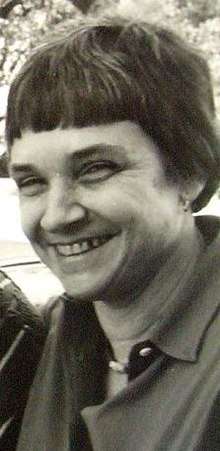
The danger lies in forgetting what we had.
Adrienne Rich (16 May 1929 - 27 March 2012) was an American feminist, poet, teacher, and writer.
Quotes
- A thinking woman sleeps with monsters.
- Snapshots of a Daughter-in-Law (1963), no. 3
- Women's Studies can amount simply to compensatory history; too often they fail to challenge the intellectual and political structures that must be challenged if women as a group are ever to come into collective, nonexclusionary freedom.
- Blood, Bread and Poetry (1986), ch. 1
- To become a token woman—whether you win the Nobel Prize or merely get tenure at the cost of denying your sisters—is to become something less than a man … since men are loyal at least to their own world-view, their laws of brotherhood and self-interest.
- As quoted in Ms. magazine (September 1979), p. 44
- No woman is really an insider in the institutions fathered by masculine consciousness.
- Blood, Bread and Poetry (1986), ch. 1
- The danger lies in forgetting what we had. The flow between generations becomes a trickle, grandchildren tape-recording grandparents' memories on special occasions perhaps—no casual storytelling jogged by daily life, there being no shared daily life what with migrations, exiles, diasporas, rendings, the search for work. Or there is a shared daily life riddled with holes of silence.
- What Is Found There (1993), ch. 11
- False history gets made all day, any day,
the truth of the new is never on the news
False history gets written every day...
The lesbian archaeologist watches herself
sifting her own life out from the shards she's piecing,
asking the clay all questions but her own.- Turning the Wheel (1981), section 2
- I'm both a poet and one of the "everybodies" of my country. I live with manipulated fear, ignorance, cultural confusion and social antagonism huddling together on the faultline of an empire. I hope never to idealise poetry — it has suffered enough from that. Poetry is not a healing lotion, an emotional massage, a kind of linguistic aromatherapy. Neither is it a blueprint, nor an instruction manual, nor a billboard. There is no universal Poetry, anyway, only poetries and poetics, and the streaming, intertwining histories to which they belong. There is room, indeed necessity, for both Neruda and César Valléjo, for Pier Paolo Pasolini and Alfonsina Storni, for both Ezra Pound and Nelly Sachs. Poetries are no more pure and simple than human histories are pure and simple. And there are colonised poetics and resilient poetics, transmissions across frontiers not easily traced.
- Of course, like the consciousness behind it, behind any art, a poem can be deep or shallow, glib or visionary, prescient or stuck in an already lagging trendiness. What's pushing the grammar and syntax, the sounds, the images — is it the constriction of literalism, fundamentalism, professionalism — a stunted language? Or is it the great muscle of metaphor, drawing strength from resemblance in difference? Poetry has the capacity to remind us of something we are forbidden to see. A forgotten future: a still uncreated site whose moral architecture is founded not on ownership and dispossession, the subjection of women, outcast and tribe, but on the continuous redefining of freedom — that word now held under house arrest by the rhetoric of the "free" market. This on-going future, written-off over and over, is still within view. All over the world its paths are being rediscovered and reinvented.
There is always that in poetry which will not be grasped, which cannot be described, which survives our ardent attention, our critical theories, our late-night arguments. There is always (I am quoting the poet/translator Américo Ferrari|) "an unspeakable where, perhaps, the nucleus of the living relation between the poem and the world resides".- "Legislators of the world" in The Guardian (18 November 2006)
External links
- Academy of American Poets Page
- Groundbreaking Books: Diving Into the Wreck
- Rich's letter of refusal for the National Medal for the Arts (3 July 1997)
- Audio interview of Adrienne Rich, 1987, by Don Swaim of CBS Radio, RealAudio
- Biography and links to poems
- Modern American Poets page
- Audio recordings at PennSound
- Bombastic essay on Rich and other poets "On American Poetry Criticism; & Other Dastardly –Isms" by Dan Schneider
- "Legislators of the world" in The Guardian (18 November 2006)
This article is issued from
Wikiquote.
The text is licensed under Creative
Commons - Attribution - Sharealike.
Additional terms may apply for the media files.